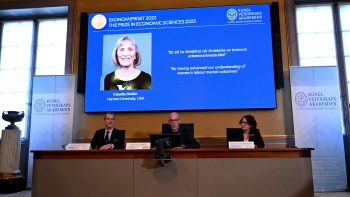
Muhammad Yunus: Wealth concentration "is a ticking time bomb"
Muhammad Yunus: Wealth concentration "is a ticking time bomb"

The following will start like a John Lennon song: Imagine a world with zero poverty. Imagine a world with zero unemployment. And imagine no extra carbon dioxide changing the climate.
That’s the type of future that Muhammad Yunus, winner of a Nobel Peace Prize, envisions in his new book, “A World of Three Zeroes.”
With the wealth gap increasing, Yunus argues there are flaws in our current economic system. He joined us to talk about capitalism, the importance of entrepreneurship, and the microlending system he developed. Below is an edited transcript.
David Brancaccio: Let’s start out right away with a flaw that you see at the center of economics, at the center of capitalism. It’s the assumption that we’re selfish.
Muhammad Yunus: Human beings are selfish — as well as selfless. The selfless part has never been used in economics, in the business world. I’m saying that’s what’s creating all the problems that we created. Wealth concentration is becoming faster and faster, and 1 percent of the population of the world owns more than 99 percent of the wealth of the world. I say this is a ticking time bomb. It will explode anytime.
| Why we still don’t grasp racial economic equality |
| Trump keeps talking about trade, but he should be talking robots |
Brancaccio: So if you can figure out a way for us to find within ourselves our more selfless inclinations, and reorder the economic system to take account of that, you think a lot of these huge problems start to dissipate?
Yunus: Yes, indeed. So at the same time, I’m raising another question: the interpretation of what economic theory has been saying. That most of us are born to work for somebody else, so it’s a job-driven economy. I say this is the wrong direction completely. Human beings are not born to work for somebody else. Human beings are basically entrepreneurs.
Brancaccio: Entrepreneurs who solve a problem by starting a business?
Yunus: Yes. As an entrepreneur, you have choices. Choices to make money for yourself, choices to solve the problems of the world in creating businesses called social business.
Brancaccio: You became concerned about the children whose parents had benefited from your microlending system, the Grameen Bank. You wondered why the kids the next generation weren’t doing better.
Yunus: The strange thing that happens is that as they come out of the schools, come out of the colleges, they’re all lining up for jobs and there are not many jobs in Bangladesh. So they get really frustrated. Then I keep telling them, “Forget about jobs.” The right idea is something that you should be telling yourself, that “I’m not a job seeker, I am a job creator.” And I give the example, “Look at your mother. She joined Grameen Bank some 20 years back, took a small loan, a $40 loan, and started a business. If your illiterate, your mother could become an entrepreneur.” There’s no reason to believe that everybody will be just lining up for the jobs. And the jobs are not coming anyway. All these jobs that we are looking for will not exist anymore because artificial intelligence will take it over.
There’s a lot happening in the world. Through it all, Marketplace is here for you.
You rely on Marketplace to break down the world’s events and tell you how it affects you in a fact-based, approachable way. We rely on your financial support to keep making that possible.
Your donation today powers the independent journalism that you rely on. For just $5/month, you can help sustain Marketplace so we can keep reporting on the things that matter to you.


















